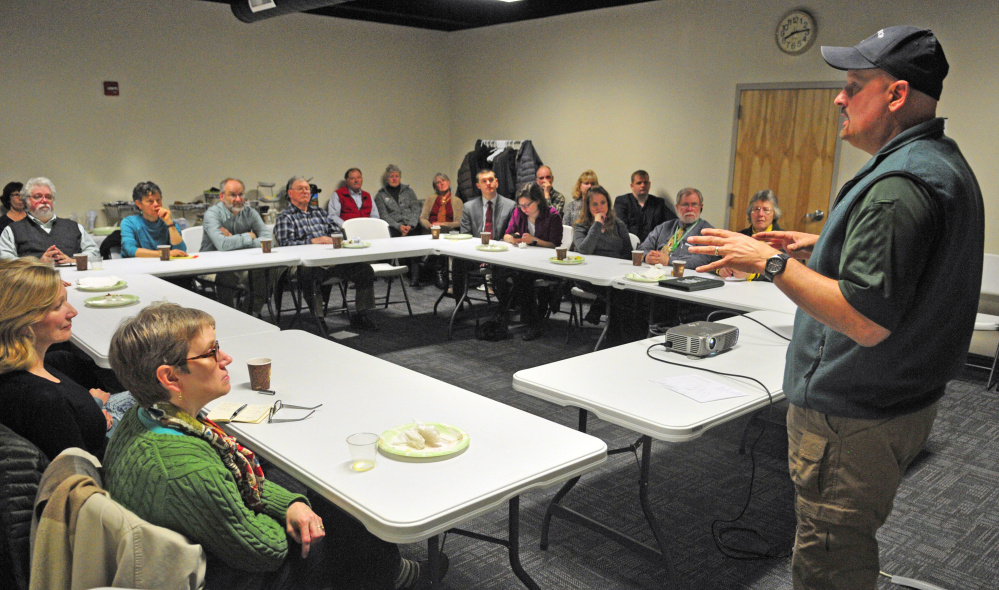The last month has provided fresh evidence of the opiate addiction crisis wracking the region, state and country — evidence that John Dovinsky, director of the Winthrop Ambulance Service, intends to share at a Wednesday evening forum on opiates at Winthrop High School.
“We have had a dramatic upswing of overdose activity in the last month,” said Dovinsky, whose taxpayer-funded service responds to seven towns in western Kennebec County. “It’s what we deal with, so I’m simply going to try to give a look at the breadth and frequency of the problem … (Area residents) need to know how many times we’re responding to these incidents. They need to know the economic costs with regards to our operations and staffing.”
As a growing number of Mainers have overdosed on heroin, prescription painkillers and more powerful opioid drugs such as fentanyl in the last year, similar forums have been held within Kennebec County and across the state.
The Winthrop Lakes Region Chamber of Commerce hosted a breakfast talk on the subject last spring, in which Dovinsky also described the dramatic upswing in overdoses his department has seen since last year. The chamber organized this week’s public forum to reach a larger audience, said Sarah Fuller, president of the Chamber’s board. The event will begin at 7 p.m. in the Winthrop Performing Arts Center.
“Education is the largest goal,” Fuller said, encouraging anyone to attend the event. “(Opiate addiction) is a problem that affects all our communities, and we wanted to give an opportunity locally for people to get information.”
The forum will include break-out discussions, Fuller said, and she’ll take note of any recommendations that come out of those sessions, whether to improve the education available in local schools, to create support groups for those affected by the crisis or to do something else.
In addition to Dovinsky, the evening’s speakers will include a physician, several police officers and other individuals who work with those directly and indirectly affected by drug addiction.
One fresh perspective will be that of Donna Strickler, executive director of Sexual Assault Crisis & Support Center, a Winthrop-based group that serves victims of sexual violence across Kennebec and Somerset counties.
Some of the effects of the ongoing crisis have been obvious. In 2016, there were 189 drug overdoses recorded in Maine as of June 30, a 50 percent increase over the same period in 2015, when there were 126 overdose deaths, according to the Maine Attorney General’s Office. If the pace continues, there would be 378 overdose deaths this year. In 2015, 272 people died from drug overdoses in Maine.
Next door to Winthrop, Monmouth Police Chief Kevin Mulherin took to Facebook in late June to ask for help solving drug crimes after three people in that town overdosed on heroin or other opioids in a single week.
On Monday, Dovinsky, the ambulance director, did not have an exact count of how many overdoses were reported in the Winthrop area in the last month’s upswing, but both the human and economic costs of the crisis have been clear to him.
In the last year, authorities have noted an uptick in the mixing of heroin with more powerful substances such as fentanyl. Overdoses become more likely when fentanyl enters the mix, and rescuing users from those stronger batches has taken more manpower and resources, Dovinksy said.
By speaking at Wednesday’s forum, Dovinsky said he hopes to educate area residents about the importance of preventing and treating drug addiction, not just to stop people from using the dangerous drugs in the first place, but also so that they might put pressure on state and federal lawmakers to make more funding available for responding to the crisis.
Kennebec County Sheriff Ryan Reardon, who will join Chief Ryan Frost and Detective Peter Struck of the Winthrop Police Department at the forum, agreed with Dovinsky about the dangerous emergence of fentanyl-based drugs and the need for more public funding to treat and prevent drug addiction. He pointed to the crowding of the state’s jails as evidence that more treatment opportunities are needed.
“I’m hoping to reach that one person to hopefully avoid tragedy,” Reardon said. “I’m hoping to at least educate the public. People know it’s going on, but I don’t think people know the significance of the impact it’s having on the community.”
Charles Eichacker — 621-5642
Twitter: @ceichacker
Copy the Story Link
Send questions/comments to the editors.




Success. Please wait for the page to reload. If the page does not reload within 5 seconds, please refresh the page.
Enter your email and password to access comments.
Hi, to comment on stories you must . This profile is in addition to your subscription and website login.
Already have a commenting profile? .
Invalid username/password.
Please check your email to confirm and complete your registration.
Only subscribers are eligible to post comments. Please subscribe or login first for digital access. Here’s why.
Use the form below to reset your password. When you've submitted your account email, we will send an email with a reset code.